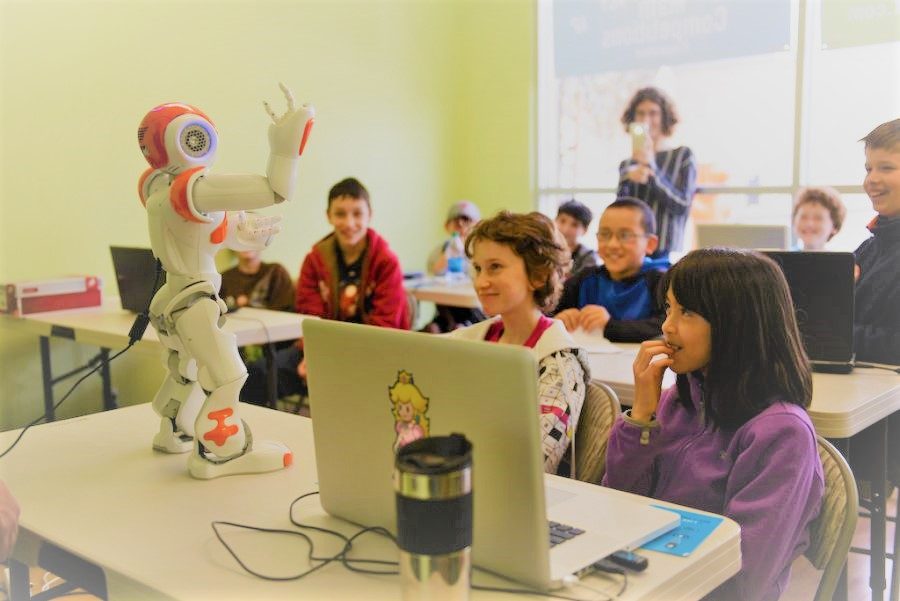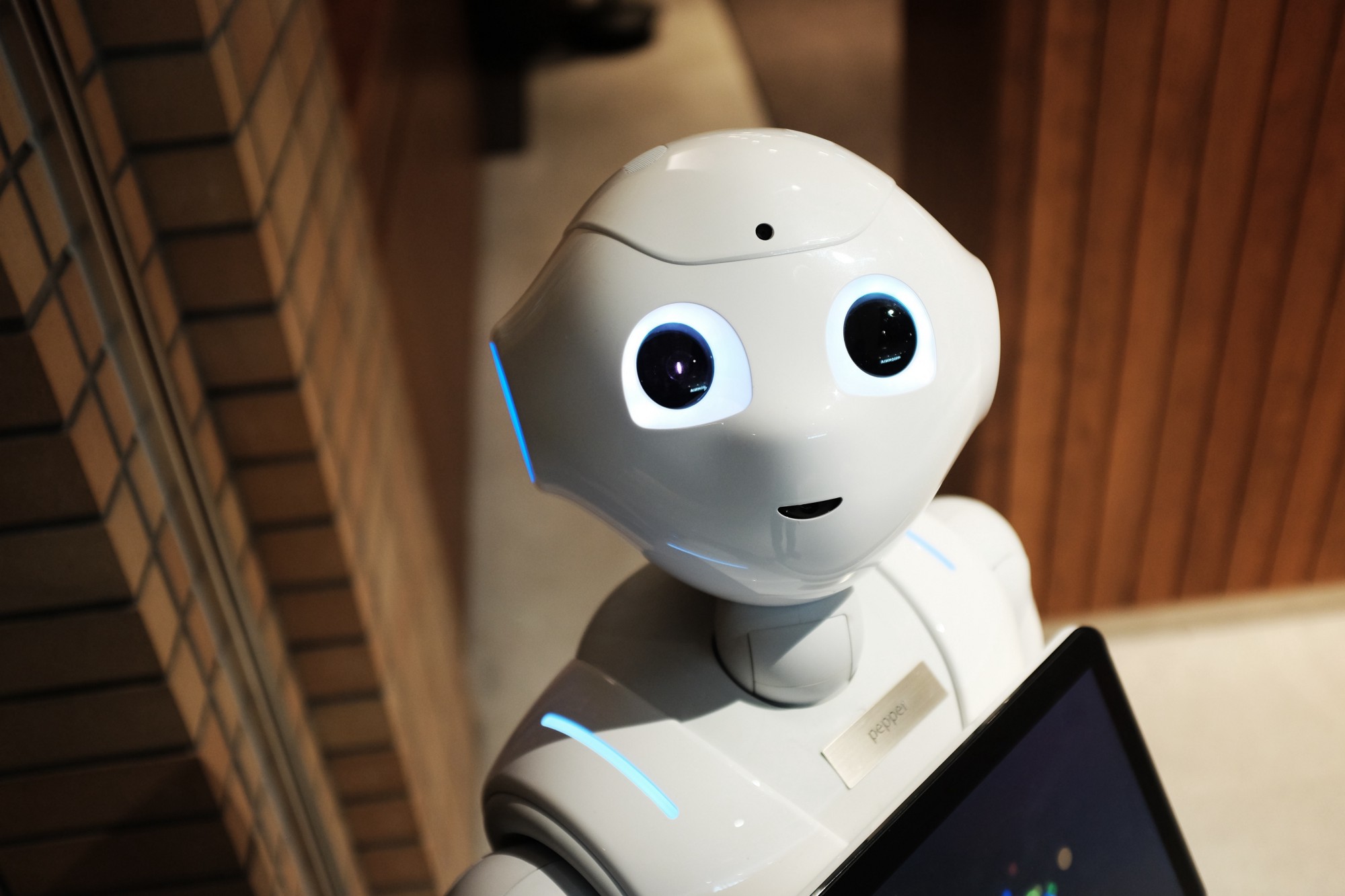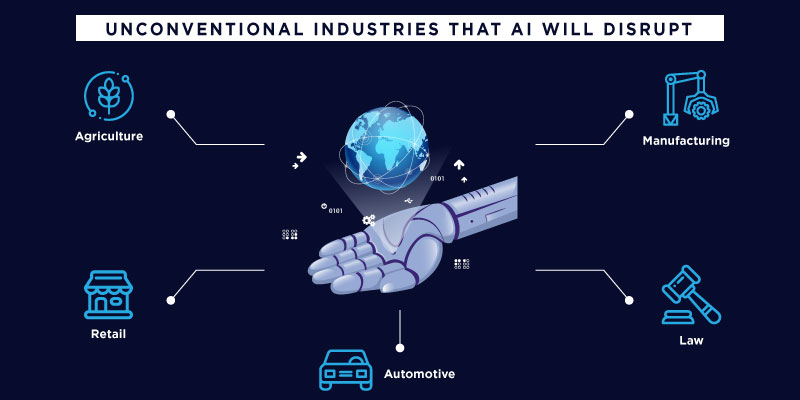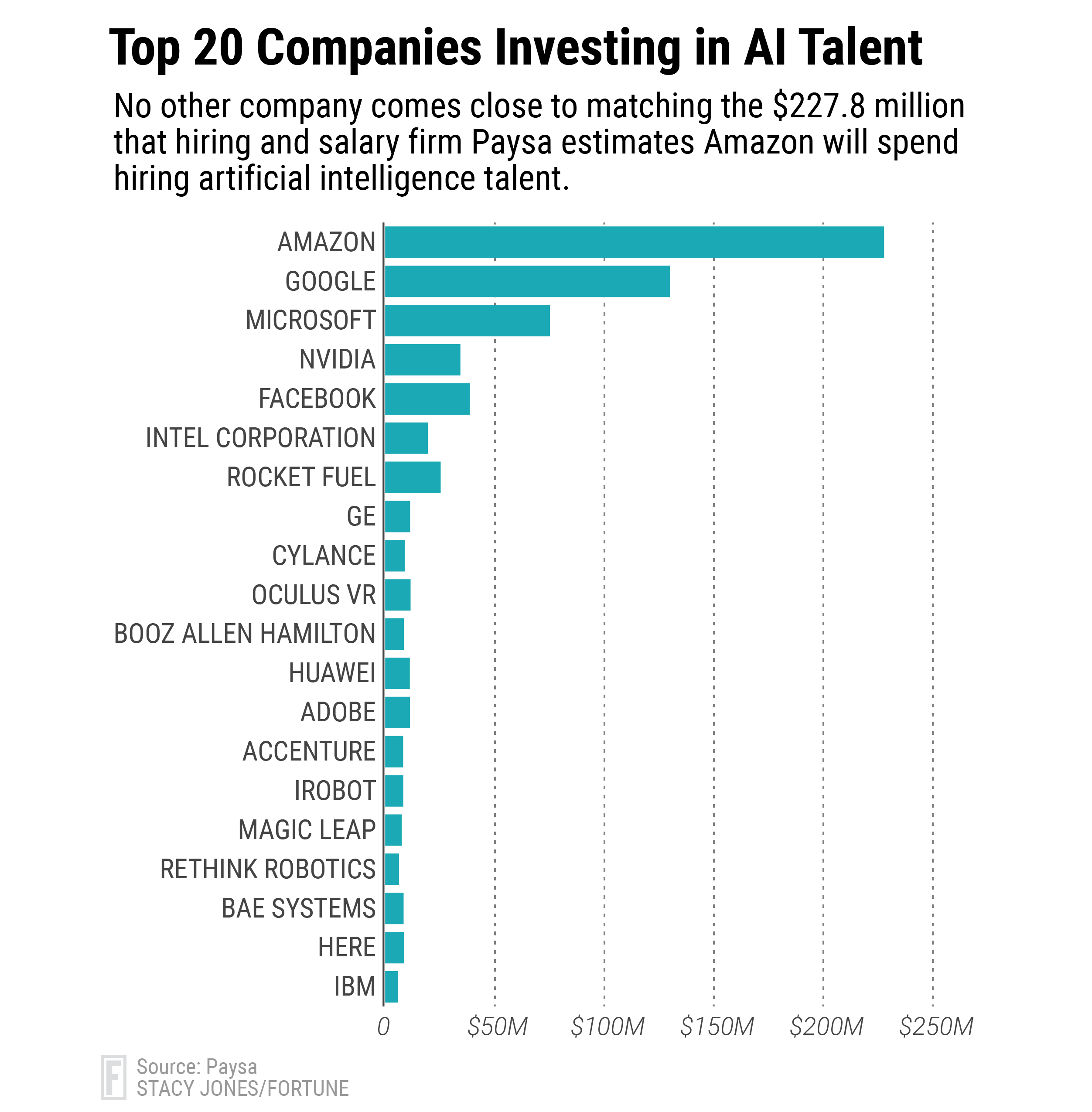The future is here!!
From fighting terminal illnesses to developing a companion for the elderly, technology companies like Apple, Google, Microsoft, and Alibaba share their expectations for the coming year. Some way or the other, Artificial Intelligence is under everyone’s hood.
One can expect to see more, not less of AI in the coming year. More jobs would be created rather than snatched away by AI; at least this is what tech giants are believing.
Amazon’s CEO, Jeff Bezos in a statement on the future of AI said, “I predict that, because of artificial intelligence and its ability to automate certain tasks that in the past were impossible to automate, not only will we have a much wealthier civilization, but the quality of work will go up very significantly and a higher fraction of people will have callings and careers relative to today.”
How will AI develop in 2019?
Tech biggies like Alibaba, Google, and Microsoft, have come up with ambitious plans to ‘democratize‘ AI.
Google seems to be spearheading this revolution through its offering, Tensorflow. Tensorflow is helping small businesses and developers innovate through its open-source machine learning framework.
Another AI project by Google, Jigsaw leverages artificial intelligence to detect toxic comments and hate speech which has proven to be quite successful. This tool assigns a toxicity score to a piece of text based on numerous parameters.
In a bid to expand their horizons, Google is targeting emerging economies like India to expand its offerings. Indian policymakers and government officials are being trained in AI tools to streamline governance. NITI Aayog, a policy think-tank of the government of India, is partnering with Google to work on an array of initiatives to help build an Artificial Intelligence (AI) ecosystem across the country.
Amitabh Kant, Chief Executive Officer of NITI Aayog, said in a statement: “NITI’s partnership with Google will unlock massive training initiatives, support start-ups and encourage AI research through PhD scholarships, all of which contribute to the larger idea of a technologically-empowered New India,”
Through their collaboration, the organizations are planning to conduct hands-on training programmes to sensitize and educate lawmakers and technical experts in government about relevant AI tools and how they can be used to streamline governance.

On the same lines, Chinese tech behemoth Alibaba aims to bring sweeping and disruptive changes to China’s vibrant business landscape.
The machine intelligence technology division leads Alibaba’s efforts into AI. The division is working in areas including computer vision, speech recognition, optimization, and natural language processing.
One of the projects underway comes in the form of AliMe, an AI-enabled chatbot Alibaba developed that recognizes what people say both in terms of the text and the speech.
Not limiting the use cases of AI to just e-commerce and retail, Alibaba has ventured AI in farming and agriculture. On this front, the company is coming up with initiatives that can carry out a variety of things including, tracking animal IDs, detecting nutrition management, etc.
“Alibaba has changed the everyday life of the Chinese in China. Looking forward, our visionary leader, Jack Ma, wants us to be able to reach two billion consumers and to help 10 million businesses around the world. That’s a huge call, but we already have half of the platforms in place.” said Alibaba’s chief scientist Xiaofeng Ren, in a statement to CeBIT.
Meanwhile, Microsoft too is getting on the AI bandwagon. It’s CEO Satya Nadella in a bid to demonstrate that Microsoft can develop state-of-art services and still be a trusted provider for preserving user’s data has come up with a plan to expand the offerings of its digital assistant Cortana. Microsoft is targeting the office space to introduce a workplace-specific service to integrate AI into more of its enterprise services.
What will become increasingly important?
At the helm of all these AI developments that planned is, ‘Data.’ According to an industry insider, the benefits of AI can only be reaped if the data being used is fit for purpose.
Major AI companies are leading in this domain solely because of the fact that they have a lot of data for the algorithm to be trained on. For these techniques, to prove fruitful, it is extremely critical to have smart and relevant data. The performance of algorithms is more dependent on quantity rather than the quality of the data. Unless you can feed all the knowledge manually, it is vital to have an abundance of data for the algorithm to be trained on.
Artificial Intelligence rests upon the idea of mimicking how humans learn. All of our life experiences act as a set of data for us to learn. Thus a successful AI needs to mirror human behaviour to get successful.
Let us change the frame of reference and drill down to some of the significant developments that AI is definitely going to witness in 2019.
1. More jobs will be created by AI than lost to it
A utopian workless future will still be a distant fantasy in the coming year. It is still far from reality that the rise of machines will take over our jobs and cause a social strife all over the world. According to a Gartner report, as many as 1.8 million jobs would be lost to automation, especially in manufacturing, but also, 2.3 million would be up for grabs!
According to a Gartner report, as many as 1.8 million jobs would be lost to automation, especially in manufacturing, but also, 2.3 million would be up for grabs!
Let us consider a scenario to understand the situation better – Consider a garment factory, imagine a machine operator in a factory. Although a portion of his/her job could get automated, they will definitely have other roles, for instance, managing inventory and overseeing junior workers, which computers cannot supervise. Also consider the difference between a worker in a US garment factory and its counterpart in Vietnam: the American unit is more likely to be technologically forward, and a typical worker’s day will likely include a higher number of non-routine tasks that can’t be automated.
Undoubtedly, it is fairly accurate to say that non-manual jobs will be lost to AI, but more and more will be created as well! Repetitive tasks wouldn’t need to be performed by humans, and we will get more time to utilize our creative thinking and exemplary abilities to perform tangible tasks.
Industries such as education, IT services, public sector, especially healthcare will see a drastic infusion of new job opportunities pertaining to AI.
Although when it comes to doctors and lawyer, AI service providers have made a concerted effort to present their technology as something which can work alongside human professionals, assisting them with repetitive tasks while leaving the “final call” to them.
2. AI assistants will become a fixture in enterprises

AI is so intertwined in our everyday lives that we don’t even realize it, from a simple Google search to shopping at Amazon, or watching Netflix – AI is at work to provide us with the best-personalized experience.
With significant product releases from the likes of Apple, Samsung, Google, Amazon, and several other vendors – It is evident that people are embracing the comfortable and conversational modes of interaction.
2018 was the year of consumer voice assistant, 2019 will be the year where enterprises will see an influx of voice assistants in their day-to-day operations. Already, enterprises have begun realizing the importance of conversational technologies and are leveraging them as an extension of their businesses to support a wide range of tasks.
NLP (Natural Language Processing) and Machine Learning AI assistants will become increasingly efficient, thanks to their exposure to more and more information about how we communicate. By the end of 2019, these assistants will become so sophisticated that they would be able to anticipate our behavior, read our facial expressions, and even understand our habits.
3. AI will venture beyond tech companies
Many AI luminaries believe that AI has a much broader scope outside the tech domain. Citing use cases from a recent McKinsey report which found that AI will generate revenue of more than $ 10 trillion in GDP by 2030.
According to Andrew Ng, co-founder of Google Brain, “I think a lot of the stories to be told next year (2019) would be in AI applications outside of the software industry. As an industry, we’ve done a quite decent job of helping companies like Google and Baidu, but also Facebook and Microsoft — which I have nothing to do with — but even companies like Square and Airbnb, Pinterest, are starting to use some AI capabilities. I think the next massive wave of value creation will be when you can get a manufacturing company or agriculture devices company or a health care company to develop dozens of AI solutions to help their businesses.”
 Many companies are recognizing the importance of catching up to AI technology, lest they be left behind. Here are 11 industries that are experiencing disruption.
Many companies are recognizing the importance of catching up to AI technology, lest they be left behind. Here are 11 industries that are experiencing disruption.
• Agriculture
• Retail
• Manufacturing
• Law
• Automotive
Although the domain that would reap the maximum benefits will definitely be healthcare. The following could be significant developments in healthcare:
• Managing Medical Records and Other Data
• Doing Repetitive Jobs
• Virtual Nurses
• Precision Medicine
• Health Monitoring
• Healthcare System Analysis
• Drug Creation
4. SMEs will see a significant transformation in 2019
The small and medium-sized businesses are bound to see a major overhaul in 2019. This is precisely due to the recent commitments by tech giants – Organizations like Google, Amazon, Facebook, etc. are offering open-source frameworks that could easily be integrated with the current business processes.
In 2019, SMEs would no longer need to break the bank to incorporate AI into their operations. By leveraging existing platforms like Tensorflow (By Google), Keras, SparkMLlib, Caffe, etc., SMEs could save considerable cost and time which would have otherwise been required in developing and designing the products in-house.
Apart from this 2019 would also witness an influx of new AI-powered analytics tools. These tools are beneficial for businesses who don’t want to invest heavily in Artificial Intelligence and are still looking to reap the benefits of it. Analytics tools offer a gateway for small businesses to leverage the potential of AI even if they do not possess a vast amount of data.
Must Read: How Can AI Benefit Small Businesses
5. AI skills will become increasingly in demand
Organizations have been facing an impertinent issue of lack of technical skills required for developing to-the-mark AI products.
AI-related skills, as well as in related areas such as machine learning are in short supply today. Due to the relative newness of this technology, most educational institutions haven’t yet introduced a dedicated curriculum in their syllabus for AI and deep learning. This has created a crevice of sorts in the demand and supply of skilled AI professionals who are good with these skills.

Source: paysa.com
As the democratization of AI is on the lines – It has to become viable for both, the tech giants and small and medium-sized businesses to recruit AI professionals easily.
Moreover, AI professionals require extensive on-the-job training, and as of now, there aren’t enough experienced AI professionals to take over leadership roles required by organizations who are just beginning to introduce AI in their services.
2019 would see tech giants such as Amazon and Google invest globally in expanding their talent pool. The Google Brain facility in Toronto is exclusively dedicated to research in AI; also Amazon has established an AI-focused lab in England and plans to build a similar facility in Spain.
Wrapping Up
The application and use case of Artificial Intelligence is beginning to encompass more and more businesses and is becoming a critical aspect of our everyday lives. As this article suggests, the use of machine learning is not just limited to the more conventional industries. Its use goes far beyond what one can imagine – Even bloggers nowadays are utilizing machine learning algorithms to engage users and improve their conversion rates.
Many companies already see the competitive edge AI-powered solutions can give and we can easily anticipate now more than ever the unusual uses of artificial intelligence in the future.
But the elephant in the room certainly needs to be addressed – The advancement and the evolution of AI comes with abundant risks. Due to its relative infancy, no proper regulations have been put in place to ensure that this gold mine doesn’t get exploited by notorious elements.
We urgently need to account for ethics and issues of bias during the development of these AI-based products, whereas today organizations easily overlook these things.
Considering how gruesome it is in finding the perfect tech partners for developing an efficient AI product. EngineerBabu houses a talented bunch of AI professionals who have proven their mettle by creating hundreds of successful AI products based on Machine Learning and Deep Learning technologies.
Contact Us for a free consultation call, we would love to guide you. In the meanwhile, check out some of our amazing AI products, right here.
